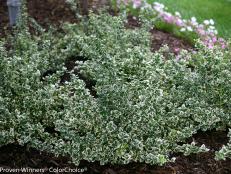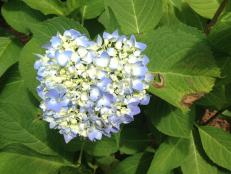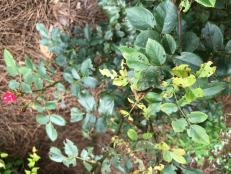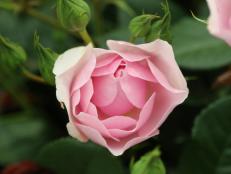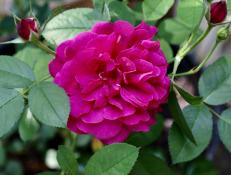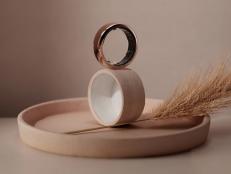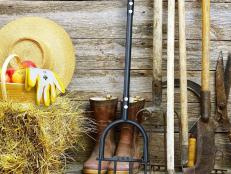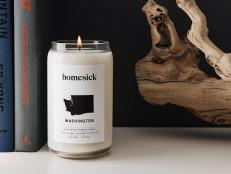Natural Products to Keep Your Rose Garden Safe

Black spot and aphids: two things gardeners don't want to think about when caring for roses. But black spot, a fungal disease, is common, particularly among hybrid teas, polyanthas and floribunda roses. Aphids spread the disease, as well as do damage to the plant themselves.
As you do battle with garden pests and diseases like these, it's important to know that using natural products instead of chemicals helps attract the right kind of bugs -- like lady beetles, which can help combat, rather than spread, diseases.
Treating Insects

If roses are already infected with black spot and aphids, treat the bugs first. Aphids get fungal spores on their legs, and as they move across these plants they'll actually transmit them from one plant to another.
Aphids are soft-bodied insects, so they're easy to control. A strong blast of water from the hose will help, but really, a good insecticidal soap -- an off-the-shelf, all natural product that's ready to spray -- is a good deal more effective. Aphids typically hide on the undersides of leaves, so make sure to spray the top and bottom sides of your plants. Two to three thorough applications spaced five to seven days apart should do it.
Another bug you might want to watch out for is the earwig, which can slink off cut roses you bring into the house. Insecticidal soap helps here too. But here's another trick: Roll up and secure a few sections of your newspaper and place them at the foot of your plants. Earwigs seeking shelter will crawl into the rolls, and you will simply gather up the rolls and shake the bugs into a bucket of soapy water.
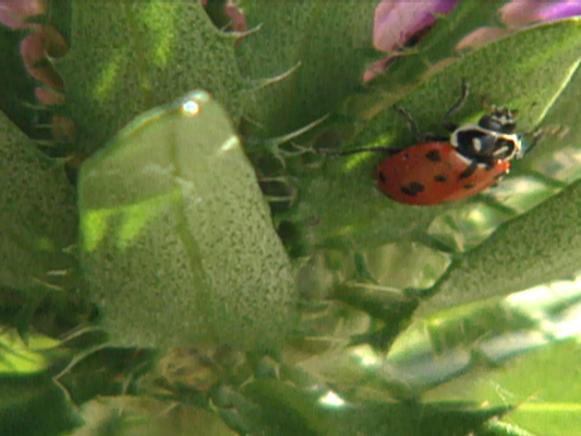
Preventing Black Spot
The best way to deal with black spot is to properly maintain your roses, says Gardening by the Yard host Paul James. Here are some tips:
- Plant roses in an area that gets good air circulation. Where you've got stagnant air, then you're setting the stage for fungal disease invasion.
- Reapply mulch routinely throughout the year, two or three times during the growing season. The microscopic fungal spores that create black spot will overwinter in the mulch and soil. When you water the plants or it rains, the water will shoot those spores back onto the leaf surfaces.
- Discard all leaves that fall around your roses.
- When you water, water only the base of the plant.
You may still see black spot, though these steps will reduce the chances. The next step is a preventive spraying program, using a homemade fungicide.
Paul James isn't always a fan of homemade concoctions, but this one was developed by Cornell University as a fungicide specifically for rose diseases. The recipe:
1 tsp. baking soda (which acts as a fungicide)
1 tsp. insecticidal soap (to keep aphids at bay)
1 tsp. horticultural oil
1 quart water
By spraying a layer of this oil onto the leaf surface, the fungal spore cannot attach to it. For any fungal spores that are already there, the baking soda will take care of them. Preventive spraying should be done every five to seven days through the growing season.
Keep Morning Glories at Bay

It's got a sweet name, but the morning glory is a particularly nasty vine, and it can take over quickly. A short-term fix is to pull every visible root. But long-term solutions are the way to go.
Use natural herbicides that contain clove oil and vinegar. An ideal solution contains 20 percent vinegar, which is a good natural herbicide.
Clove oil and vinegar translocate -- or travel -- through a plant's vascular system, all the way to the roots. Two applications spaced two to three days should kill a morning glory vine.
insecticidal soap - Garden Safe
horticultural oil (All Seasons horticultural and dormant spray oil) - Bonide
Clove oil/vinegar (BurnOut weed and grass killer) - St. Gabriel Laboratories






